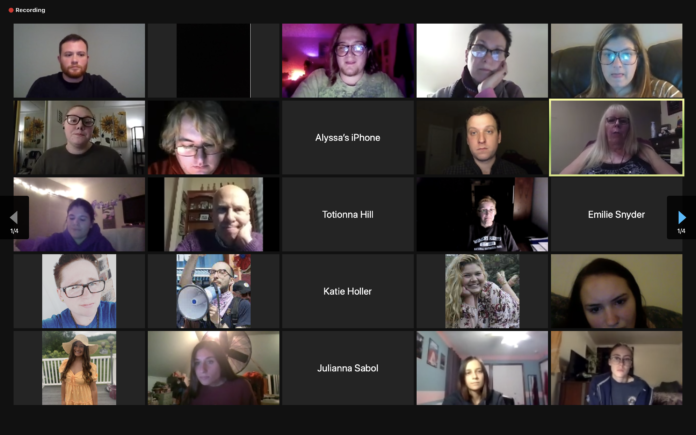
On Tuesday, Oct. 6, Cindy LaCom, director of the Gender Studies Program, and Karter Schachner, the gender studies graduate assistant, led a conversation in “Trans Embodiment: Mapping New Pathways in Healthcare Institutions.”
When asked what the drive was for this conversation, LaCom mentioned the impacts that COVID-19 has had on oppressed groups of people and the conversation commonly came down to capitalism.
“That led us to organize a year of programming, this fall and next spring, that focuses on deconstructing capitalism in varied contexts,” LaCom said.
The conversation Tuesday night was focused on, as LaCom said, “how trans embodiment is further marginalized and oppressed because of capitalist institutions like health care and insurance.”
There was a panel of guests who embodied a range of experiences and perspectives. The panel included Mavon Gumble (they/them), Leslie McMurray(she/her), Atticus Ranck (he/him) and Rae Inmon (they/he). This group ranged from previous SRU students, current grad students, and even some who work in the medical field directly with the trans community. LaCom had expressed her happiness with the panel by saying, “I think we were incredibly lucky to have such articulate and interesting participants.”
The first question of the evening, asked by Schachner, was “What barriers do trans people experience navigating healthcare?”
McMurray, who works directly with many organizations for trans healthcare, started off the conversation strongly by saying, “The big problem with healthcare is that trans people walk into a physician’s office with more knowledge of trans health than the physicians. This needs to change. There needs to be change in the medical curriculum . . . we need to educate doctors”
Gumble added directly after this, “Healthcare is triggering.” They brought up the reality that, “it is easier to just avoid the drama by not going.”
There were many great points made and a meaningful conversation was happening, but Ranck had concluded this part of the conversation with some powerful words.
In response to the question and piggy backing off of the panel, he said, “Every trans person has some horror story from the healthcare system.” He then brought to the group’s attention that often times, trans people have to be weary of their doctors and their opinions on trans people.” He added to his previous statement, “We need to change the atmosphere . . . We need to start educating trans people on navigating the system and sticking up for ourselves.”
The first question had ignited an almost thirty-minute conversation, full of passionate answers and passionate discussion between the panelists.
The second question had been about the medicalization of trans embodiment and how to possibly move forward with a liberating practice.
Inmon had started off the conversation immediately with saying, “The way we think about bodies comes from the capitalism of insurance.” They went on with many great points, but had finished off with a memorable, thought-provoking comment. They had said, “Trans people aren’t a population. We are IN the population.”
Many people may not know this, but it is almost always required to have a diagnosis of gender dysphoria in order to transition. This had started a new path of conversation.
McMurray breaks through the conversation with, “Depression and anxiety aren’t related to being transgender. They’re related to the way transgender people are treated. The conversation needs to change. These breakthroughs need to be made in the medical field because they’re so respected. By proxy, society will follow.”
This conversation had made it clear how complicated, difficult and draining the process for transitioning is.
Ranck added that the medical field makes it feel like, “If you have enough money to go through our steps then maybe we’ll let you be who you are”
The conversation had bounced between the panelists for the remainder of the hour, passion about the topics bouncing off of one another. One of the final statements of the night was from Rae Inmon. They summed up the conversation of the night by saying, “It would be helpful if we [trans people] were already at the table rather than invited to it.”
Everyone left the Zoom feeling enlightened with new information, experiences and perspective from the four panelists. There are two more panels later this fall, and more information can be found by contacting Cindy LaCom (cindy.lacom@sru.edu).







